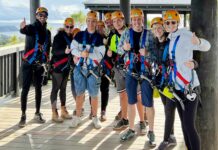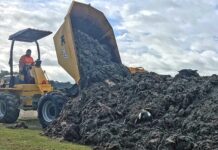A public meeting to explain Auckland Council’s approach to weed control on the island saw rigorous debate from factions for and against Waiheke Local Board’s decision to allow limited dispensation for the use of herbicides in three Waiheke parks.
About 50 people were at the Surfdale Hall meeting, which lasted more than two hours. Local board chairman Paul Walden acted as mediator between Auckland Council representatives and many in the crowd who directed angry opposition towards the board and council.
“Keep it respectful,” he said to audience members who raised their voice to council staff.
One frustrated man stormed out of the meeting after addressing the crowd on the potential risk of herbicides.
“In Europe, you can’t buy glyphosate in shops anymore, and here we get it sprayed in our faces” he said.
Council representatives offered a series of presentations explaining the council’s position and outlining its ecological restoration plans.
Council biosecurity manager Phil Brown explained the council’s Regional Pest Management Strategy and its aims to control pest such as weeds, saying a council committee is currently in the middle of updating the strategy, which will be completed in February.
Island biosecurity manager Deryn Dromgoole said Waiheke is one of its “regional priorities” for ecological restoration due to its biodiversity, before detailing the smothering effects weeds have on native plants.
Council community facilities manager Bruce Edwards then spoke about herbicide dispensation specifically, saying that council contractors were “not here to replace” local groups taking action on weeds.
“We want to get as much bang for our buck as possible,” he said of the council’s new contracting regime. He added council and contractors would look to engage with the community as much as possible over the duration of the contract.
Arborists and revegetation firm Treescape was awarded the six-year contract to tackle weeds on council land in April 2017.
Treescape project manager Paul Kviecinskas said the contractors would provide monthly reports detailing where, why, how much and what type of herbicides they used on reserves. He reiterated the company’s use of herbicides would be “minimal, targeted and controlled”.
Locals, however, raised a number of questions throughout of council representatives and Mr Walden. Local activist Ross Gillespie asked: “Why didn’t we have this meeting sooner?”
Mr Gillespie wondered why residents weren’t made more aware of the conditions of the tender process.
Others echoed his concerns that more information should have been offered before contractors were appointed.
Resident Heather Glover said she felt neither the board nor the council offered enough information before the contract was issued. “It’s easier to ask for forgiveness than permission,” she said.
Some spoke in favour of Treescape’s previous work, saying the use of herbicides was a necessary step to dealing with invasive weed species.
Also clarified at the meeting were the conditions over a perceived moratorium over all herbicide use on Waiheke and the length of the contract. Mr Edwards and Mr Walden said herbicide dispensation had happened periodically since the 1990s and was also granted in 2013.
“One of the frustrations we’ve had is the vacuum of integrated thinking,” Mr Walden said.
“We didn’t know the council was introducing this ecological restoration contract, and it’s not a contract we’ve historically had. But look, we are where we are; we’re locked into a contract with Treescape over the next six years.”
• Richard Jones







